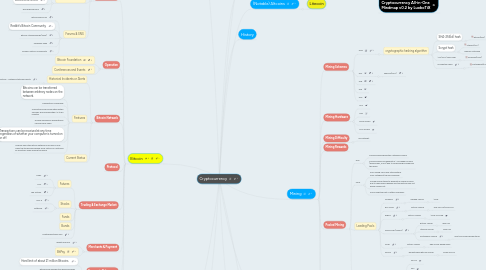
1. Bitcoin
1.1. Knowledge Base
1.1.1. News
1.1.1.1. Bitcoin Magazine
1.1.1.2. CoinDesk
1.1.1.3. The Genesis Block
1.1.2. Learning Resources
1.1.2.1. Bitcoin Wiki
1.1.2.2. General FAQ
1.1.3. Charts and Statistics
1.1.3.1. Blockchain.info
1.1.3.2. Bitcoincharts.com
1.1.3.3. Blockexplorer.com
1.1.4. Forums & SNS
1.1.4.1. BitcoinTalk Forum
1.1.4.2. Reddit's Bitcoin Community
1.1.4.3. Bitcoin StackExchange (Q&A)
1.1.4.4. Facebook Page
1.1.4.5. Google+ Bitcoin Community
1.2. Operation
1.2.1. Bitcoin Foundation
1.2.2. Conferences and Events
1.3. Bitcoin Network
1.3.1. Historical Incidents or Alerts
1.3.1.1. Bitcoin - Network status and alerts
1.3.2. Features
1.3.2.1. Bitcoins can be transferred between arbitrary nodes on the network.
1.3.2.2. Transactions Irreversible
1.3.2.3. Transactions are broadcasted within seconds and verified within 10 to 60 minutes.
1.3.2.4. Double spending is prevented by using a block chain.
1.3.2.5. Transactions can be received at any time regardless of whether your computer is turned on or off.
1.3.2.6. Nobody owns the Bitcoin network much like no one owns the technology behind email. Bitcoin is controlled by all Bitcoin users around the world.
1.3.3. Current Status
1.4. Protocol
1.5. Trading & Exchange Market
1.5.1. Futures
1.5.1.1. MPEx
1.5.1.2. MT4
1.5.1.3. 796 Futures
1.5.2. Stocks
1.5.2.1. BTC-E
1.5.2.2. Bitstamp
1.5.3. Funds
1.5.4. Bunds
1.5.5. Howtobuybitcoins.info
1.6. Merchants & Payment
1.6.1. useBitcoins.info
1.6.2. BitPay
1.7. Economic Rules
1.7.1. Hard limit of about 21 million Bitcoins.
1.7.2. Bitcoins are divisible to 8 decimal places yielding a total of approx. 21×1014 currency units.
1.7.3. Transactions are cheap, and mostly free (Transaction fees).
1.8. Developement
1.8.1. Founder
1.8.1.1. Satoshi Nakamoto 中本哲史
1.8.2. Core developers
1.8.3. Software Projects
1.8.3.1. Bitcoin-Qt
1.8.3.2. bitcoinj
1.8.3.3. MultiBit
1.8.3.4. Bitcoin Wallet for Android
1.8.3.5. Armory
1.8.3.6. Electrum
1.8.3.7. picocoin
1.8.3.8. python-bitcoinlib
1.8.3.9. Bits of Proof Enterprise Bitcoin Server
2. (Bitcoin) Blockchain
2.1. Transactions
2.2. Blocks
2.3. trusted timestamping (timelock)
2.4. Coloring
3. Distribution
3.1. Node
3.2. public ledger
3.3. wallets
3.3.1. Addresses
3.3.2. Desktop wallets
3.3.3. Mobile wallets
3.3.4. Web wallets
3.3.5. Cold storage
3.3.5.1. Paper wallets
4. Spreading
4.1. Geographical
4.2. Value
4.3. Media
4.4. Users
5. Compliance & Legal Status
5.1. BitLegal.io
5.2. BitcoinComplianceModel.com
5.3. Virtual Currency Schemes - European Central Bank
5.4. Application of FinCEN’s Regulations to Persons Administering, Exchanging, or Using Virtual Currencies
5.5. AML
6. (Notable) Altcoins
6.1. Litecoin
7. Mining
7.1. Mining Schemes
7.1.1. PoW
7.1.1.1. cryptographic hashing algorithm
7.1.1.1.1. SHA-256(d) hash
7.1.1.1.2. Scrypt hash
7.1.1.1.3. 1CC/2CC/TWN hash
7.1.1.1.4. Momentum hash
7.1.2. PoS
7.1.2.1. Peercoin(PPC)
7.1.3. PoB
7.1.4. PoE
7.1.5. PoD
7.2. Mining Hardware
7.2.1. CPU
7.2.2. GPU
7.2.3. FPGA miners
7.2.4. ASIC miners
7.3. Mining Difficulty
7.3.1. Diff retarget
7.4. Mining Rewards
7.5. Pooled Mining
7.5.1. Pros
7.5.1.1. Pooled mining generates a steadier income.
7.5.1.2. Pooled mining can generate a 1-2% higher income (before fees, if any) due to long polling provided by the pools.
7.5.2. Cons
7.5.2.1. Pool mining can suffer interruptions from outages at the pool provider.
7.5.2.2. Pooled mining tends to generate a smaller income due to fees being charged and transaction fees not being cashed out.
7.5.2.3. Pools might be part of attack scenarios.
7.5.3. Leading Pools
7.5.3.1. GHash.io
7.5.3.1.1. Merged Mining
7.5.3.2. BTC Guild
7.5.3.2.1. Bitcoin Mining
7.5.3.3. Eligius
7.5.3.3.1. Bitcoin Mining
7.5.3.4. Discus Fish (F2Pool)
7.5.3.4.1. Bitcoin Mining
7.5.3.4.2. Litecoin Mining
7.5.3.4.3. Protoshares Mining
7.5.3.5. Slush
7.5.3.5.1. Bitcoin Mining
7.5.3.6. P2Pool
7.5.3.6.1. decentralized Bitcoin mining
7.5.4. Reward Types & Explanation
7.5.4.1. PPLNS
7.5.4.2. PPS
7.5.4.3. Others
7.5.4.4. Visual examples of the various payout methods
7.5.4.5. Comparison of mining pools
7.6. Solo Mining
7.6.1. Pros
7.6.1.1. Solo mining is less prone to outages resulting in higher uptime.
7.6.1.2. Solo mining doesn't incur any fees. For each discovered block, 25 BTC and the transaction fees are paid to the miner.
7.6.2. Cons
7.6.2.1. Solo mining tends to generate more erratic income.
7.6.2.2. Solo mining wastes time due to only supporting getwork pull.
7.6.2.3. Solo Mining needs a large amount of hashing power, thus it's almost impossible to do with bitcoins, while mining alt-coins in solo mode is still acceptable
7.7. Mining Software
8. Usage & Solution
8.1. General Trading
8.1.1. fee
8.2. Micropayments
9. History
10. Encryption & Signing
11. Security
11.1. Common_Vulnerabilities
11.1.1. 51% Attack
11.1.2. Double Spending
11.1.2.1. Race attack
11.1.2.2. Finney attack
11.1.2.3. Vector76 attack
11.1.2.4. Brute force attack

